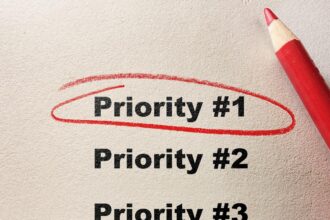The new Baltimore Ravens NFL season started the same way it ended last year—with a gut-wrenching one-score loss to the annoyingly-popular Kansas City Chiefs. Worse yet, it was a literal matter of inches that kept the Ravens from tying or winning both games—with a goal-line fumble last season in the AFC Championship and a touchdown called back Thursday night as time expired, ruling that Isaiah Likely’s toe (toenail, really) was out of bounds.
Unfortunately, the promulgation of schtick-selling personal finance gurus and coupon-snipping money savers have cast the impression that personal financial management is, like football, a “game of inches.” They’d have us believe that the difference between financial success and failure depends on our choice to buy a latte. Nonetheless, while it’s absolutely true that the little financial decisions are worth our attention because of their inevitable accrual, it’s my observation that a much smaller number of BIGGER financial decisions we make have the BIGGEST impact on our financial future.
What are some of the bigger decisions that can make or break us?
The largest financial decision you’ll ever make is your choice of spouse or partner.
If you’re already hitched, this is water under the proverbial bridge, and it is worth it for you to learn how to fight fair in your money conflicts. And if you were previously married, you know what I’m about to tell you—that divorce is, for many, the most expensive single decision they’ll ever make.
Therefore, if you’re not married, I implore you to address finances with your partner-to-be before making any long-term commitments. Address the past mistakes that you or they may bring into a union, their present financial status, and their future financial vision. Have the hard conversations earlier in your relationship in recognition that more than 50% of marriages end in divorce, often citing financial disagreements as the primary reason, and the price tag for divorce is also almost always 50% of your assets and much of your income.
But beyond the potential loss due to divorce, the stark fact is that our partnerships are typically only as strong as the weakest partner, especially from a financial perspective. If you have meaningfully varied differences in how you approach money, I promise you it will become an issue. We can’t avoid it because most decisions we make in life have financial implications—and most financial decisions also send reverberations throughout our lives. Yes, it will show up on your personal balance sheets and income statements, but you’ll likely find it very effective tinder for the fire of disagreement. You need not have the identical financial standing or beliefs of your life partner—but those beliefs must be shared and reconciled, lest they become the seeds of discontent that often lead to divorce.
The second-largest financial decision most people make is whether to have kids—and how many.
Don’t get me wrong, children are one of the greatest joys in life, and I wouldn’t give mine back for any amount of money, but they are also pricey little buggers. U.S. News and World Report suggests that the average cost of raising a child today (in 2024) is “north of $310,000.” I’d wager it’s well north because their calculations don’t include some important inflation calculations—or college, which will run you a cool hundred grand even at your local State U for tuition, room, and board.
The third most impactful financial decision you’ll likely make is where you live.
Yes, this includes your home and the choice to rent or buy—but also the cost of your community (the dreaded HOA), local and state taxes, and especially today, the cost of our debt service is also a primary issue with skyrocketing interest rates as much as doubling mortgage payments even for lateral moves. Rules of thumb only offer guidance because housing costs are so geographically sensitive, but you should almost certainly choose one of these rules as a guide to ensure you don’t end up house-poor:
While the banks will often give you loans up to 30% of your gross monthly income, if you want to feel more margin in your life, 25% is likely a more comfortable number. If you want to be really conservative, you could focus on spending only 25% of your net income on housing.
The fourth larger expense that requires our attention is the cost of transportation, your choice of wheels.
Is it just me, or does it feel like this expense has seen a hyperbolic increase over the past 20 years? I mean, watching the fateful football game I referenced earlier, I saw an advertisement for a pickup truck offering 5.9% financing for 84 months. That’s a seven-year car payment for a vehicle whose price starts in the mid-sixties and could easily break six figures before you drive off the lot. If you’re in that upper price range, that’s a $1,456 monthly car payment and $22,000 in interest payments alone!
The average car payment in the U.S. in 2024 is $730. If you’re my age, the chances are pretty good that your current car payment is equal to or greater than your first mortgage payment, so while I’m not on the lonely drive-a-beater-until-you-can-buy-something-better-in-cash band wagon, I do believe we need to recognize and account for the significant cost of our transportation. And the payment is just the beginning, especially if you’re insuring those kiddos we talked about.
The last major expense that may not have crossed your mind is the cost of funding your future.
You’ve likely heard the grandfatherly wisdom of saving 10% of your income for the future before you start allocating income to the present—and while this rule *may* result in a positive outcome when you seek to retire, life is not linear. Therefore, we’re better suited to dedicate 15% or even up to 20% of our income to savings from an early age, recognizing that we’ll likely endure stretches where our life decisions lead to reductions in savings due to the increased costs of, say, over-reaching on a car payment or mortgage, putting kids through college, or enduring a major financial mishap or divorce.
Now, if I’ve frustrated you with this list or made you feel overwhelmed, please know that I’m not judging you. I’ve learned many of the lessons I share through hard-won experience, and I don’t think I have any right to tell you how and where to spend your money—much less whom to marry or whether to send your kids to private school.
The main point is to focus on our bigger expenditures, rather than the little ones that are often used as a whipping post for personal finance gurus. In fact, if you do the hard work of following the advice above, I believe it can free you to buy the biggest, most expensive latte money can buy—or whatever experience brings you and yours joy—uninhibited and gloriously guilt free.
Read the full article here










